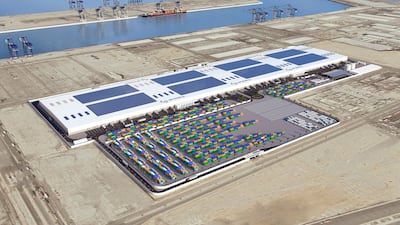Global ports operator DP World and the Saudi Ports Authority have begun construction on a logistics park in the coastal city of Jeddah, which is expected to grow the kingdom as a crucial trade hub in the Middle East.
The 900 million Saudi riyal ($240 million) Jeddah Logistics Park at Jeddah Islamic Port will be built over 415,000 square metres, making it Saudi Arabia's largest integrated logistics park, Dubai Media Office said on Sunday.
The greenfield site will host 185,000 square metres of warehousing space, which will be able to hold more than 390,000 pallet positions and give customers “an efficient platform for the seamless flow of goods to and from Jeddah”, it said.
Plans for the park were unveiled in 2022. It is part of a 30-year concession agreement initially signed in 2020, in which DP World committed to invest more than 3 billion riyals to expand and modernise the Jeddah port, which currently handles about 60 per cent of the kingdom’s seaborne imports.
The park, which will be developed in two phases, is scheduled to be operational by the second quarter of 2025. It will be powered by a solar rooftop capable of generating 20MW of renewable energy.
“Jeddah Logistics Park, strategically located on the vital Asia-Europe shipping route, will provide world-class multimodal connectivity and market access for our customers,” Sultan bin Sulayem, chairman and chief executive of DP World, said during the park's groundbreaking ceremony.
It will also play an important role in “supporting the ambitious aims of Saudi Vision 2030“, he said, referring to the kingdom's ambitious economic strategy to diversify away from oil.
DP World said the Jeddah port's South Container Terminal is currently in the final phase of its modernisation project that will grow its handling capacity to up to five million twenty-foot equivalent units. It is scheduled to be completed in the fourth quarter of 2024.
DP World's investments are expected to further boost operations at the port, which is located on the Red Sea and is the largest in Saudi Arabia. About 4.5 million TEU is handled by the port annually, according to DP World.
It has continued to expand its footprint regionally and globally, and counts Saudi Arabia, the Arab world's largest economy, as “always [having] been a deeply important market”, Mr Bin Sulayem said.
Last year, Dubai Media Office said DP World invested more than $10 billion in the global logistics sector since 2012, making it one of the top five overseas investors during the period.
Saudi Arabia, on the other hand, has been boosting its industries in line with its economic aspirations, heavily investing in infrastructure, logistics and technology, among others.
Jeddah Logistics Park will allow Mawani to expand the number of logistics centres in Saudi ports, “in partnership with major national and international companies”, Omar bin Talal Hariri, president of Mawani, said.
In March, a company representative told The National that it plans to expand its freight-forwarding network to 180 offices globally by the end of this year, as it seeks to grow its supply chain services amid increasing disruption to global trade.
DP World has opened 100 freight-forwarding offices globally over the past eight months – including recently in Dammam, Jeddah and Riyadh – with an additional 80 offices planned by the end of 2024.
The move aims to provide customers with efficient access to cost-effective and reliable supply chains while helping them navigate the complexities of global trade.
In April, DP World partnered with Brazilian railway operator Rumo to build a terminal at Brazil’s Santos port – one of the largest ports in Latin America – to manage 12.5 million tonnes of cargo annually, at an estimated cost of $500 million.


